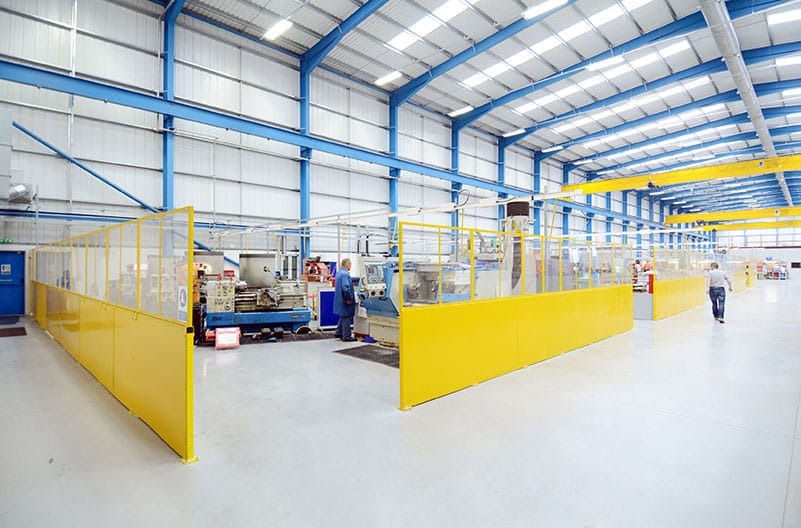Modern manufacturing and industrial environments are constantly evolving. As production lines expand and businesses grow, space management and workplace safety become top priorities. One of the most efficient and flexible ways to optimise an industrial layout is by installing a factory partition system.
These modular, durable structures allow businesses to divide large open spaces into functional zones—without the need for costly and permanent building work.
From creating offices within workshops to enclosing machinery for safety, factory partitions have become a cornerstone of industrial design and efficiency.
What Is a Factory Partition?
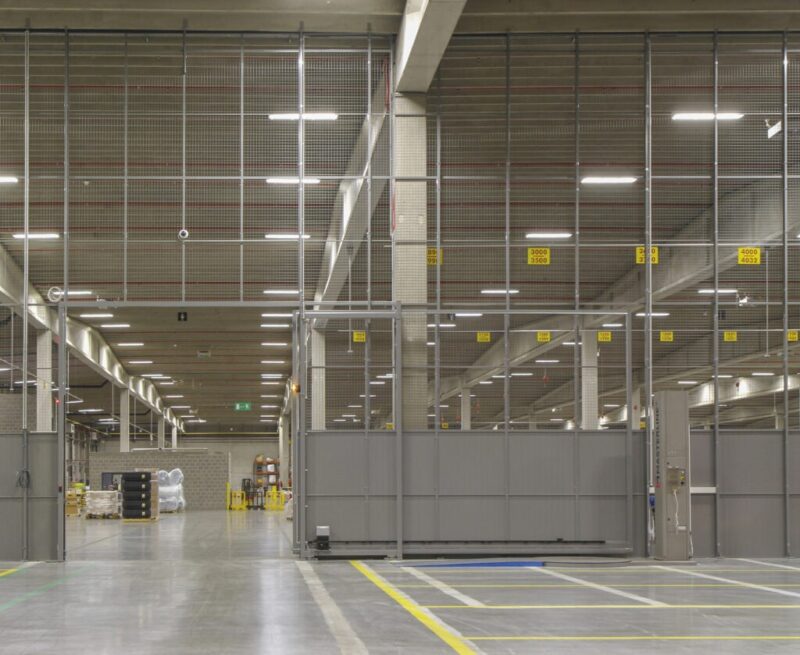
A factory partition is a modular wall or enclosure system used to divide work areas within industrial buildings such as factories, warehouses, and workshops. Constructed from materials such as steel, mesh, or composite panels, these partitions can be temporary or semi-permanent depending on operational needs.
Unlike traditional brick walls, factory partitions are designed to be flexible and easy to reconfigure. They provide a quick and cost-effective way to create dedicated spaces for offices, storage, or production, helping to improve workflow, safety, and compliance.
The Key Benefits of Installing Factory Partitions
1. Optimised Space Utilisation
Many factories and warehouses have large, open-plan layouts that can be difficult to organise. Factory partitions enable you to segment these spaces efficiently—creating designated areas for production, assembly, storage, or administration.
By using vertical space effectively, you can streamline operations and make the most of your available square footage without expanding the building.
2. Improved Safety and Compliance
Health and safety regulations require manufacturers to minimise workplace hazards. Factory partitions help achieve this by physically separating high-risk areas, such as machinery zones or chemical storage, from general workspaces.
Clear boundaries also reduce the risk of unauthorised access and improve compliance with HSE guidelines, particularly those related to noise, dust, and temperature control.
3. Better Workflow and Organisation
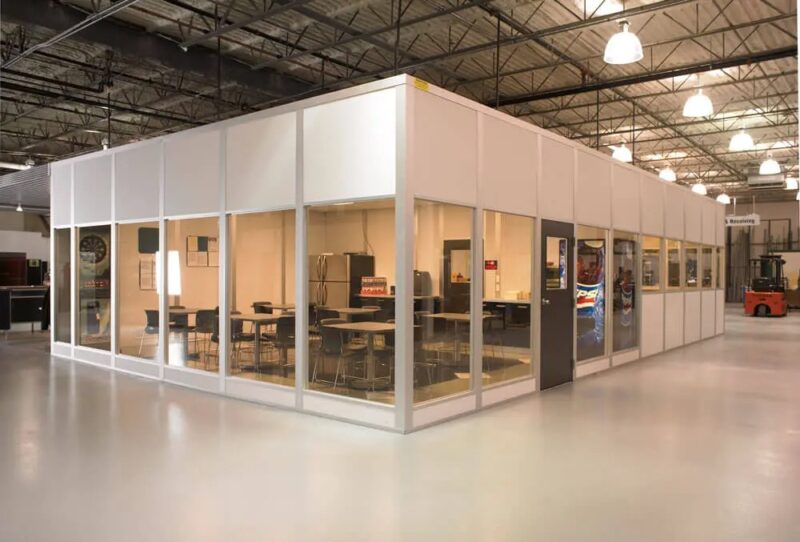
A well-organised workspace is a productive one. By defining clear zones, partitions make it easier for staff to navigate the facility, locate tools, and understand which areas are restricted or specialised.
For example, a fabrication area can be isolated from an assembly line to prevent cross-contamination, while storage zones can be enclosed to keep materials secure and easy to access.
4. Enhanced Privacy and Comfort
In many manufacturing sites, office and administrative areas are located within or adjacent to the main production floor.
Factory partitions allow you to build comfortable, quiet workspaces without removing yourself from the operational environment.
Sound-insulated wall systems can significantly reduce noise levels, creating a more pleasant environment for meetings, management, or design teams.
5. Cost-Effective and Flexible
Compared with traditional construction, factory partitions are faster to install, less disruptive, and easier to modify. If your production layout changes or your business grows, the panels can be relocated or expanded as needed.
This modular flexibility offers long-term cost savings while maintaining operational agility.
Common Types of Factory Partitions
1. Steel Partition Systems
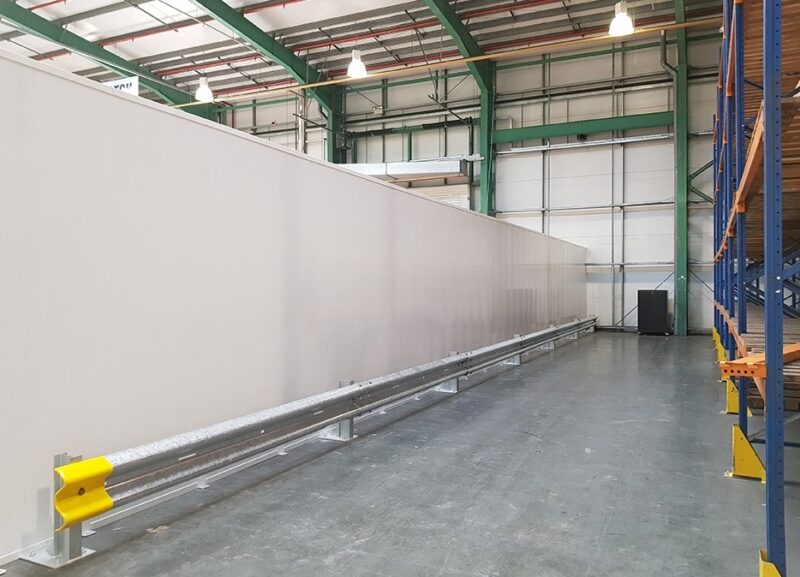
Steel partitions are known for their durability and strength. They’re ideal for heavy-duty industrial environments that require long-lasting protection and security. Available in single or double-skin designs, they can also provide sound insulation and fire resistance.
2. Mesh Partitions
Mesh systems are widely used for areas where visibility and airflow are essential—such as around machinery, storage cages, or restricted zones. The open design allows supervision and ventilation while maintaining security and separation.
3. Composite Panel Partitions
These combine steel frames with infill materials such as plasterboard, insulated panels, or glass. They’re perfect for building factory offices, cleanrooms, or temperature-controlled zones within larger industrial spaces.
4. Demountable Modular Systems
Fully modular systems allow for fast installation and easy relocation. They’re particularly beneficial for growing businesses that frequently adapt their layout or expand operations.
Typical Applications of Factory Partitioning
Manufacturing Facilities

Factory partitions can be used to isolate noisy or dusty production areas, protect employees from machinery, and create clear process zones for assembly, packaging, or inspection.
Warehouses and Logistics Centres
Partitions help separate goods-in and goods-out areas, create secure storage cages, and define forklift routes for improved safety.
Engineering Workshops
Workshops often benefit from separate tool storage, welding bays, and maintenance areas—all achievable with modular partition systems.
Cleanrooms and Controlled Environments
Specialist industries such as pharmaceuticals or electronics can use insulated or hygienic panels to create dust-free, temperature-controlled environments within existing buildings.
Office and Administrative Areas
Modular partitions make it easy to build offices, meeting rooms, and break areas directly within the factory floor, maintaining visibility and accessibility.
Choosing the Right Factory Partition System
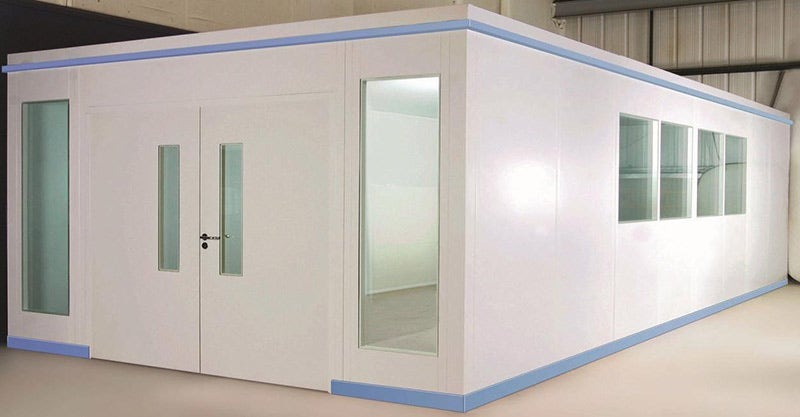
When selecting a partitioning system for your facility, consider the following factors:
- Purpose: Identify whether the partition will be used for security, safety, sound reduction, or temperature control.
- Materials: Choose between solid, mesh, or composite panels depending on your operational needs.
- Access Requirements: Decide on the type of doors, gates, or access control needed for each area.
- Regulatory Compliance: Ensure the system meets fire, acoustic, and health and safety standards.
- Aesthetic and Branding: For customer-facing areas, opt for finishes that align with your company’s image.
Working with an experienced supplier ensures your partition is both practical and compliant with relevant regulations.
The Installation Process
Factory partitions can usually be installed with minimal disruption. The process typically includes:
- Site Survey and Design Consultation – Assessing your space and workflow to determine the best configuration.
- Panel Fabrication – Customising materials and finishes to suit your application.
- Installation – Quick assembly by experienced technicians, often without the need for heavy construction.
- Finishing Touches – Adding doors, windows, insulation, or branding as required.
Because most systems are modular, installation can take place over a weekend or during planned downtime, keeping productivity uninterrupted.
Why Choose DBC Industrial?
When it comes to high-quality industrial partitioning, DBC Industrial is one of the UK’s most trusted providers.
Their expertise spans across factory, warehouse, and workshop environments, offering custom solutions built around each client’s operational needs.
From robust factory partition systems to secure mesh enclosures and cleanroom installations, DBC Industrial combines superior materials with professional installation to ensure lasting performance.
Their team takes care of everything—from initial design and site survey to aftercare—so you can focus on running your business efficiently.
Maintenance and Longevity
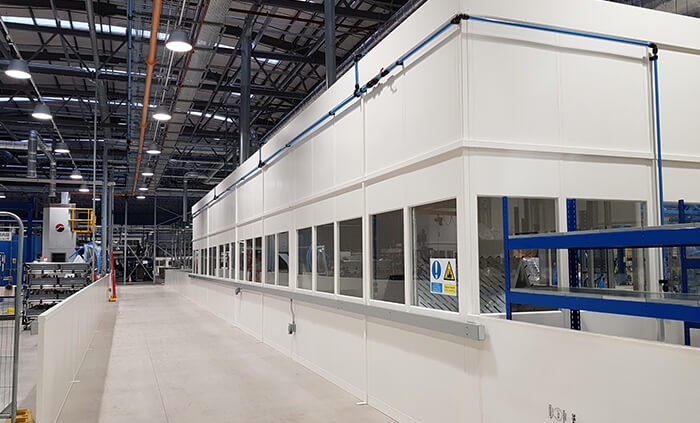
Once installed, factory partitions require very little upkeep. Regular inspections to ensure panels, doors, and fixings remain secure are generally all that’s needed.
Powder-coated and galvanised finishes protect against corrosion, while soundproof or insulated systems maintain their performance for years.
Should your layout evolve, individual panels can be relocated or replaced easily without extensive construction work—making factory partitions a genuinely future-proof investment.
Conclusion
In today’s fast-paced industrial landscape, flexibility and efficiency are vital. Factory partitions provide a practical and affordable way to maximise space, improve safety, and create tailored work environments that grow with your business.
Whether you need to separate production zones, build internal offices, or enhance workplace safety, DBC Industrial offers a full range of partitioning solutions to meet your needs.
Discover more about custom factory partition systems from DBC Industrial today and transform your workspace into a more organised, secure, and productive environment.

